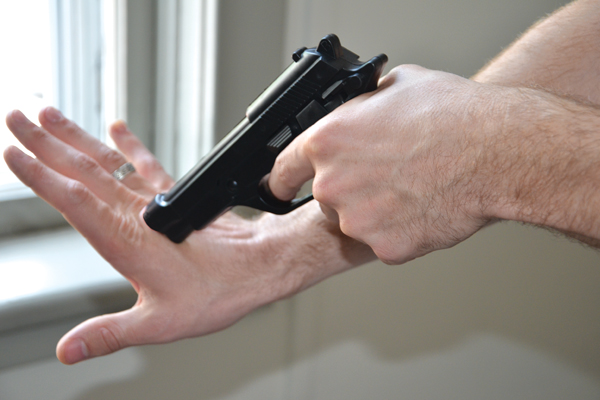New internet fad popularized by U of O student
Brianna CampigottoA new Internet challenge has gone viral across social media. For two weeks now, the so-called Handgun Challenge has spread across North America, having already raised more than $15 million for the Feline Leukemia Society (FLS).
Rather than dowsing yourself in ice water (like in the Ice Bucket Challenge), the Handgun Challenge requires its participants to suffer a self-inflicted gunshot wound on camera, and to follow up that act of mutilation by challenging at least three people to do the same.
The amount of money one is obliged to donate to FLS is determined by where you choose to get shot. For example, a light shoulder wound will force you to donate $100, while a bullet to the head will only cost you $5.
While this new challenge is now a full-blown international phenomenon, the trend was actually started by a student from the University of Ottawa. Donald McGrew, a third-year engineering student who hails from the United States, simply wanted to raise money for his sick cat Snuffles, even if it meant going to extreme lengths.
“Feline leukemia is a disease that often gets overlooked by the media,” McGrew told the Tomato from a hospital bed in his hometown of Macon, Ga., where he is spending the last weeks of his summer vacation. “All I wanted to do was raise awareness for this cause. I thought the best way to do that was to shoot myself in the thigh.”
Since McGrew posted his original video on Aug. 14, the Handgun Challenge spread across the continent, with thousands of people posting their own videos to Facebook and YouTube every day. Even high profile celebrities like Robert Downey Jr. and Meryl Streep have decided to take on this new challenge, although most of them have decided to blast paparazzi and TMZ reporters instead of shooting themselves.
Despite the popularity and success of this charitable campaign, the Handgun Challenge has garnered a number of critics who have said that it is an excessively dangerous way to raise money. Others have claimed that many participants are completely ignorant of the charitable component of this challenge.
Handgun Challenge survivor Jack Hartigan confirms this concern.
“I found out that I was supposed to pledge money after the fact,” said Hartigan, who was hospitalized in his home state of Missouri. “It just seemed like a good idea at the time. Besides, my friend challenged me to do it on Facebook, and I don’t back down from nothing.”
With these misgivings in mind, the FLS still scheduled a press conference on Aug. 26, where spokesperson Adrian Reed expressed the organization’s immense gratitude for those who have donated.
“We are so thrilled that people are risking their lives to fight feline leukemia,” she said. “Hopefully, everybody who takes on the challenge remembers to donate on our website before pulling the trigger. Dead people have a bad habit of not honouring their payments.”
Even though experts say these kinds of Internet fads tend to wane in popularity after two or three weeks, McGrew is confident the Handgun Challenge will inspire similar charitable campaigns in the future. “There are countless numbers of worthy health organizations who need financial support,” he said. “Fittingly enough, thanks to the Internet there are dozens of ways you can mutilate yourself on camera and maybe donate money if you feel like it. What a great age we live in.”





